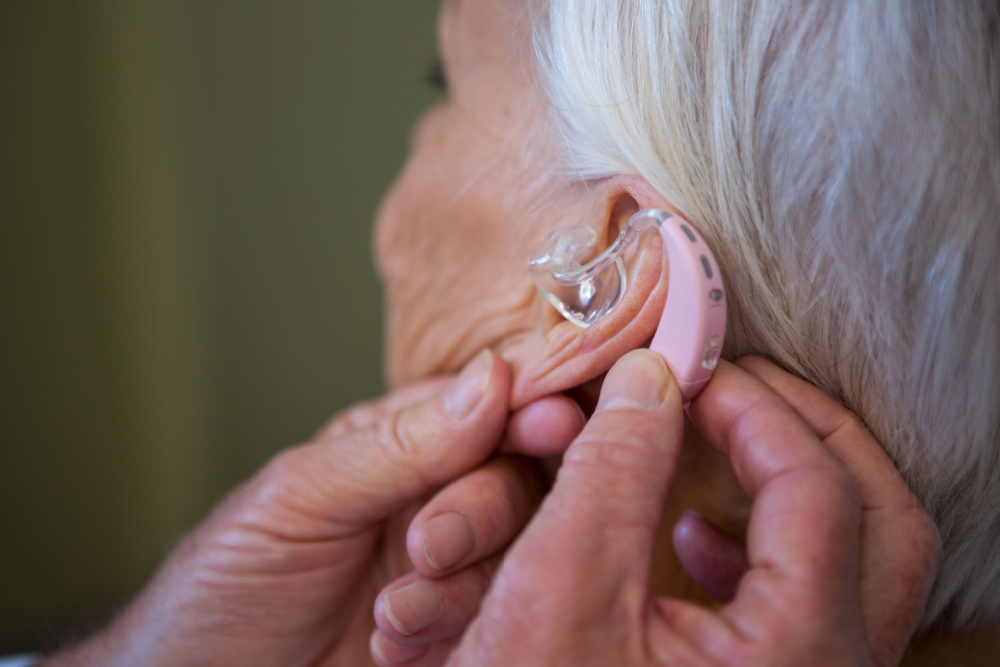Hearing loss is a common condition that affects millions of people worldwide. It can significantly impact an individual’s overall quality of life, hindering their ability to communicate effectively, engage in social activities, and enjoy everyday experiences. Fortunately, the advent of hearing aids has revolutionized the way we address hearing loss. These remarkable devices have become indispensable tools for individuals with hearing impairment, offering a range of benefits that can greatly enhance their daily lives.
Table of Contents
- How Hearing Loss Impacts Daily Life
- The Advantages of Hearing Aids
- Different Types of Hearing Aids
- Considerations When Choosing a Hearing Aid
- Frequently Asked Questions (FAQs)
- Tips for Proper Hearing Aid Maintenance
- The Impact of Hearing Loss on End-of-Life Care
How Hearing Loss Impacts Daily Life
Before delving into the advantages of hearing aids, it is essential to understand how hearing loss can impact an individual’s daily life. Hearing loss can manifest in various degrees, ranging from mild to profound. Regardless of the severity, it can have a profound effect on a person’s ability to engage in conversations, enjoy music and entertainment, and participate in social activities.
Individuals with untreated hearing loss may experience difficulties in understanding speech, particularly in noisy environments. They may also face challenges in following conversations, leading to feelings of isolation, frustration, and even depression. Additionally, hearing loss can impede job performance, strain personal relationships, and compromise overall well-being.
The Advantages of Hearing Aids
Improved Communication and Social Interaction
Hearing aids play a crucial role in restoring and enhancing communication abilities for individuals with hearing loss. By amplifying sounds and clarifying speech, these devices enable better comprehension of conversations and allow individuals to actively participate in social interactions. This improvement in communication fosters stronger connections with loved ones, promotes inclusivity, and reduces the risk of social isolation.
Enhanced Quality of Life
The use of hearing aids has been shown to significantly enhance the quality of life for individuals with hearing loss. By providing access to a wider range of sounds, these devices enable individuals to reconnect with the world around them. Hearing aids allow individuals to fully enjoy music, appreciate nature sounds, and engage in recreational activities, leading to increased happiness and overall satisfaction in life.
Better Cognitive Function and Mental Health
Recent research has highlighted the strong correlation between hearing loss and cognitive decline. Untreated hearing loss can strain cognitive resources, leading to mental exhaustion, reduced memory function, and an increased risk of conditions such as dementia. By wearing hearing aids, individuals can alleviate the cognitive burden and maintain their mental sharpness. Hearing aids also contribute to improved mental health by reducing feelings of frustration, anxiety, and depression associated with untreated hearing loss.
Safety and Awareness in the Surroundings
Hearing loss can compromise an individual’s safety, as they may struggle to detect important auditory cues, such as alarms, sirens, or approaching vehicles. Hearing aids act as a vital safety net by amplifying these critical sounds and increasing awareness of one’s surroundings. With the assistance of hearing aids, individuals can navigate their environment with greater confidence, ensuring their well-being and reducing the risk of accidents.
Different Types of Hearing Aids
Hearing aids come in various types, each designed to address specific hearing loss needs and personal preferences. The most common types of hearing aids include:
- Behind-the-Ear (BTE) Hearing Aids:
These devices rest comfortably behind the ear and deliver sound through a tube and an earmold or dome placed inside the ear. BTE hearing aids are suitable for a wide range of hearing loss levels and offer robust amplification capabilities.
- In-the-Ear (ITE) Hearing Aids:
Custom-made to fit inside the outer ear, ITE hearing aids are discreet and provide a natural sound experience. They are available in different sizes to accommodate varying degrees of hearing loss.
- Receiver-in-Canal (RIC) Hearing Aids:
RIC hearing aids are similar to BTE devices but feature a tiny receiver or speaker placed directly in the ear canal. This design offers improved sound quality, comfort, and reduced occlusion effect.
- Completely-in-Canal (CIC) Hearing Aids:
CIC hearing aids are the smallest and most discreet type, fitting entirely within the ear canal. Their compact size makes them nearly invisible, but they are best suited for mild to moderate hearing loss.
- Invisible-in-Canal (IIC) Hearing Aids:
As the name suggests, IIC hearing aids are virtually invisible when worn as they sit deep within the ear canal. They provide a discreet solution for individuals with mild to moderate hearing loss.
It is important to consult with a hearing care professional to determine the most suitable type of hearing aid based on individual needs and preferences.
Considerations When Choosing a Hearing Aid
When selecting a hearing aid, several factors should be taken into consideration to ensure the best possible fit and functionality. These factors include:
Style and Design
The style and design of a hearing aid should align with both functional and aesthetic preferences. Some individuals may prioritize discreetness, while others may value the ability to customize the appearance of their device. Additionally, factors such as comfort, ease of use, and durability should be evaluated when choosing a hearing aid.
Technology and Features
Hearing aids are equipped with various advanced technologies and features designed to enhance sound quality and improve the listening experience. Some common features include background noise reduction, directional microphones, wireless connectivity, and rechargeable batteries. Evaluating the available technologies and choosing those that best address individual needs can significantly enhance the overall hearing aid experience.
Budget and Affordability
The cost of hearing aids can vary significantly based on the type, features, and brand. It is essential to establish a realistic budget and explore financing options or insurance coverage, if available. While cost is a consideration, it is equally important to prioritize the quality and effectiveness of the hearing aid in addressing specific hearing loss requirements.
Frequently Asked Questions (FAQs)
- Will wearing hearing aids restore my hearing completely?
While hearing aids cannot restore hearing to its original state, they can significantly improve hearing capabilities for individuals with hearing loss. Hearing aids amplify sounds, making them clearer and more audible. However, the level of improvement may vary depending on the severity of the hearing loss and individual factors.
- Are hearing aids noticeable to others?
Modern hearing aids are designed to be discreet and blend seamlessly with the wearer’s appearance. Many devices are small and sit discreetly either behind the ear or within the ear canal. However, the visibility of a hearing aid may depend on factors such as hairstyle, ear anatomy, and the chosen style of the hearing aid.
- How long does it take to adjust to wearing hearing aids?
The adjustment period for wearing hearing aids can vary from person to person. Initially, some individuals may need time to acclimate to the new sounds and sensations provided by the devices. With consistent use and proper guidance from a hearing care professional, most individuals adapt within a few weeks.
- Can I wear hearing aids if I have tinnitus?
Yes, hearing aids can be beneficial for individuals with tinnitus. Many modern hearing aids offer tinnitus masking features that can help reduce the perception of ringing or buzzing sounds associated with tinnitus. By amplifying external sounds, hearing aids can divert attention from tinnitus and provide relief.
- How often should I have my hearing aids serviced?
Regular maintenance and servicing are essential to ensure optimal performance and longevity of hearing aids. It is recommended to have hearing aids professionally cleaned, checked, and adjusted at least twice a year. Additionally, daily care and cleaning at home, as per the manufacturer’s instructions, are crucial to maintaining their functionality.
Tips for Proper Hearing Aid Maintenance
Proper maintenance and care of hearing aids can prolong their lifespan and ensure optimal performance. Here are some tips to keep in mind:
Cleaning and Care
Regularly clean your hearing aids using a soft, dry cloth to remove any wax or debris. Avoid using water or cleaning agents unless recommended by the manufacturer. Store hearing aids in a clean and dry case when not in use to protect them from moisture and dust.
Battery Replacement
If using disposable batteries, keep a supply on hand to ensure uninterrupted use. Follow the manufacturer’s instructions for proper battery insertion and removal. Consider investing in rechargeable hearing aids, which eliminate the need for frequent battery changes.
Regular Check-ups and Adjustments
Schedule regular check-ups with a hearing care professional to monitor the performance of your hearing aids. They can make necessary adjustments, conduct tests, and ensure that the devices continue to meet your hearing needs.
The Impact of Hearing Loss on End-of-Life Care
Hearing loss can have a profound impact on individuals receiving end-of-life care. It can create barriers in communication between patients, their families, and healthcare providers. This communication breakdown can lead to feelings of frustration, isolation, and a diminished sense of connection during a time when emotional support and understanding are crucial.
Furthermore, hearing loss can hinder the ability of patients to express their needs, preferences, and concerns effectively. It may prevent them from fully participating in important conversations and decision-making processes related to their care, potentially leading to a lack of autonomy and a reduced sense of dignity.
To learn more about ProCare Hospice of Nevada and our exceptional end-of-life care services, contact us at 702.380.8300 or submit a form here.



 Back To Top
Back To Top